Gender equality
Equal opportunity pays off in many different ways because it is the only means by which to fully exploit the available talent and innovation potential. Diverse working groups also have a positive impact on the quality of research due to the variety of perspectives, experiences and skills contributed by their members, offering considerable added value. Although the advantages of equal participation by men and women in the research system are widely known, a considerable amount of academic potential still remains unused.
In 2018, women represented 51.4% of graduates in Germany but only 24.7% of professors. Among the highest salaried professors at C4/W3 grade, the proportion of women was even lower at 20.5%.
The reasons why women are underrepresented in research are complex. Without doubt, one reason is the difficulty associated with balancing a family with a research career. Most female researchers find that they are considering starting a family precisely at the qualification stage of their research careers based on their age. However, young men are also often confronted with issues relating to starting a family and their role as a partner or father at an early stage of their careers. Childcare is still also far from adequate in Germany.
But there are other reasons why many women do not remain in the research system in the long term. For instance, many structures are still such that women find it difficult or unattractive to pursue a research career. Female researchers also tend to have less effective professional networks and are less likely to receive career support through mentoring. There are also gender-specific differences in research funding, such as the fact that women submit fewer proposals measured against their representation in a given subject area and the fact that they are still underrepresented on key decision-making bodies.
In 2012, the DFG commissioned a study on “Gender Effects in Research Funding”.
In 2002, the General Assembly of the DFG resolved to make gender equality in research a defined objective in Section 1 of the DFG’s statutes. Since then, the DFG has implemented a variety of measures to make this goal a reality.
At the DFG, equal opportunity is considered to be a management-level task. The President, Secretary General and statutory bodies of the DFG therefore work actively to improve equal opportunity in the German research system. There is also a Vice-President who is responsible for this issue and who represents it on behalf of the DFG both internally and externally.
The DFG aims to continually increase the proportion of women serving on its statutory bodies. The target set in 2017 of at least 30% female members has already been achieved in most cases. For the review process, the DFG has also defined targets for specific subject areas and programmes. Up-to-date information on this is available in the equal opportunity monitoring report.
The DFG also has an extensive set of equal opportunity measures designed to work with the various funding programmes. In the DFG’s Qualitative Gender Equality Concept, the various funding programmes are continuously evaluated to identify any obstacles to equal opportunity and maintaining a balance between career and family responsibilities, and measures are implemented to uphold equal opportunity.
A study conducted in 2017 revealed the positive impact of the Research-Oriented Standards on Gender Equality, as a result of which the member organisations of the DFG reaffirmed their voluntary commitment to the standards, first published in 2008.
- Research-Oriented Standards on Gender Equalit(interner Link)
- Study “The DFG Research-Oriented Standards on Gender Equality: Implementation and Impact” (July 2017(interner Link)
Cross-departmental cooperation at working level takes place through a working group at Head Office which meets regularly, “Equal Opportunity in the Research System”. All areas of the organisation have employee representatives in this working group. At the meetings of this working group, suggestions, enquiries and problems are discussed and joint solutions are developed.
There is no room for non-scientific criteria in the review process. However, appropriate consideration can and should be given to personal factors affecting an applicant to compensate for any disadvantages. Awareness-raising is therefore continually practised among reviewers and the members of review boards and statutory bodies to make sure they understand that the review process must not be based on non-scientific criteria such as age or gender.
Through the Gender Equality in Research Initiative (Offensive für Chancengleichheit von Wissenschaftlerinnen und Wissenschaftlern) of 29 November 2006, the DFG, together with Germany’s other major research organisations, also undertook to implement concrete measures and deploy resources to significantly increase the participation of women in research within five years.
More information about the Gender Equality in Research Initiative is available on the website of the German Council of Science and Humanities (in German only):
- www.wissenschaftsrat.de/download/archiv/ChancGleichDoku.pd(externer Link)
- www.wissenschaftsrat.de/download/archiv/2218-12.pd(externer Link)
To achieve the objectives defined in the initiative, the DFG Senate set up a working group on “Equal Opportunity in the Research System”, which surveyed the measures in place and developed further proposals on the basis of this information. The majority of these proposals have since been implemented by the DFG.
Contact persons
Here you will find the right contact(interner Link) at the DFG Head Office for various matters.
